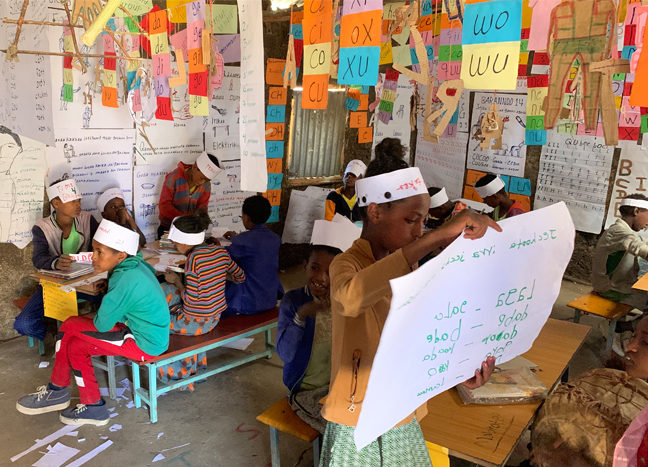This website uses cookies so that we can provide you with the best user experience possible. Cookie information is stored in your browser and performs functions such as recognising you when you return to our website and helping our team to understand which sections of the website you find most interesting and useful.
Geneva Global is part of Global Impact Ventures

Education Inititives > education articles
Speed School Featured in NISSEM Global Brief
“The difference with Speed School lies in its ability to reignite the joy of learning…”
In the November 2020 issue of NISSEM’s Global Briefs, Professor Kwame Akyeampong of The Open University and Jo Westbrook & John Pryor of the University of Sussex detail how the Speed School program and its innovative pedagogy have been effective in bringing out-of-school children into Ethiopia’s formal education system. Geneva Global’s Speed School program has been operating in Ethiopia since 2011 and in Uganda since 2016.
By the time students across Sub-Saharan Africa reach the age of 15, more than half have dropped out of school. Akyeampong, Westbrook, and Pryor point to the rigid, teacher-centered educational approach found in most classrooms in Africa as a major culprit in this outcome. Such instruction silently excludes students from poor and often illiterate families via an approach that is incongruent with their traditional culture of learning, which is centered around observation, exploration, and building relationships.
The authors assert that Speed School’s ten-month accelerated program serves to remedy this incongruence by creating a dynamic, collaborative, and inclusive learning environment. Arranged in groups of six, pupils in Speed School classrooms interact with teachers and fellow pupils to master the curriculum’s core learning objectives largely by linking their lessons to “real-life” situations. For pupils, learning is playful yet rigorous, involving them in creating, singing, simulating, and using abundant low-cost and no-cost materials. They benefit from frequent feedback and remediation, both by the teacher and their peers. As pupils acquire, verbalize, and co-construct knowledge, they build relationships with fellow pupils and the instructor. In this way, they cultivate the social and emotional elements that are essential for all learners but especially for those who are often marginalized due to physical ability, gender, and familial status. Furthermore, by incorporating local language and cultural knowledge into the curriculum, the inclusive Speed School pedagogy affirms and builds upon pupils’ identities and abilities, fostering the intrinsic capacity and confidence they will need to succeed in formal education.
Referring to a longitudinal study the same authors completed in 2017, Akyeampong et al. find that the Speed School program’s distinct approach has had a demonstrable and enduring benefit on pupils. Of all program graduates tracked over a six-year period, an impressive 75% remained in school. Additionally, “graduates” of the Speed School program performed consistently better than those of the study’s control group in Mathematics, English, and Sidama, the local language. Fostering motivated and capable learners, the authors assert that the ten-month accelerated Speed School model effectively reverses the initial learning disadvantage faced by out-of-school children, whether dropouts or those who never passed through a school door.
The article concludes that:
“the difference [with Speed School] lies in its ability to reignite the joy of learning – and, for the facilitators, of teaching – by using learning activities such as games, drama, music, etc. to make social and emotional learning the central ingredient of learning. [While] the pedagogy retains some teacher-centered features, … students move quickly to progressive learning modes that allow them freedom to investigate and co-construct knowledge.”
It proposes more research, focused especially on measuring how effective the Speed School pedagogy is when used at scale and with larger pupil-teacher ratios. What we would add to this proposed research agenda is an exploration of the conditions that accompany the adoption of Speed School and of their impacts on the model’s success. This includes the role of the Self-Help Group and the overall holistic approach to training.
In the end, the NISSEM article presents the Speed School model and its associated pedagogy as being worthy of attention both because of what happens and the solid learning outcomes. Of equal, and arguably greater, importance is how Geneva Global works with its civil society and government partners to ensure that the quality of implementation is consistently high to achieve the results. It’s not just the “what” but also the “how” that matter, a message that funders and governments neglect all too often, to the peril of sustained and scaled programming.
